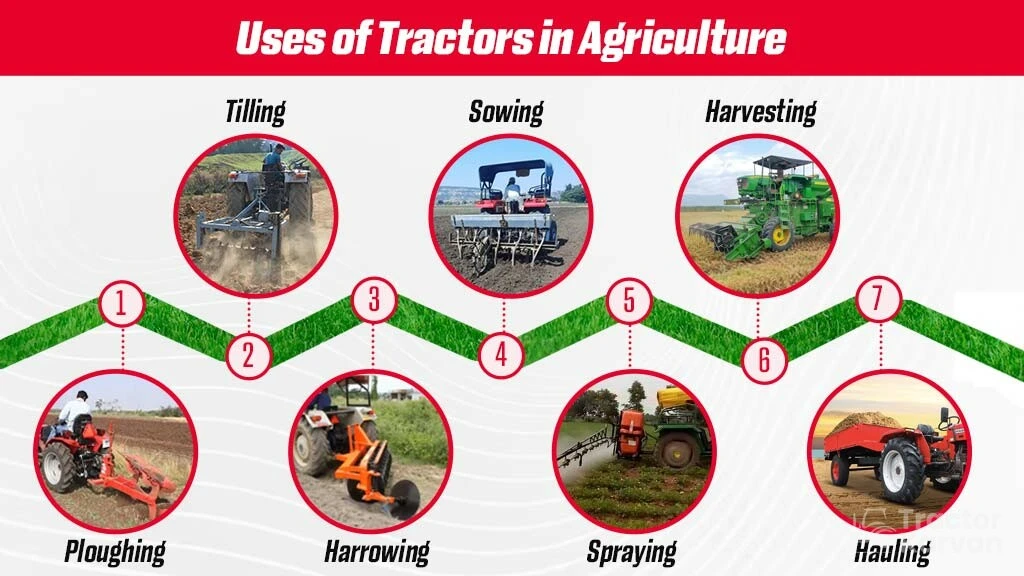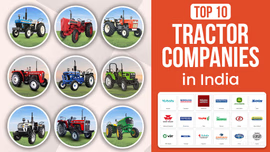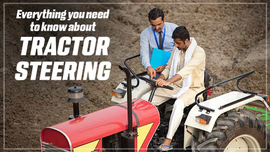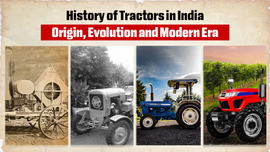What is a Tractor – Meaning, Types and Function

There is no doubt that tractors have revolutionized agriculture by delivering unmatched power and versatility. They are known for generating high torque at low speeds. Whether you are ploughing, sowing, hauling or landscaping, tractors have offered ease of operations along with time savings. Let’s check out the meaning, types and uses of tractors to get a comprehensive look at this crucial farm machinery.
Table of Contents
- What is a Tractor?
- What are the Main Uses of Tractors in Agriculture?
- Classification of Tractors
- What are the Different Types of Tractors in India?
- How to Choose the Right Tractor for Your Farm?
What is a Tractor?
With modern agriculture, the use of tractors has become largely unavoidable for increased efficiency and productivity. Due to technological advancements, farmers are adopting farm machinery to simplify farm operations. The word “Tractor” originates from ‘trahere’, which is Latin for ‘to pull’. It is a self-propelled agricultural machine used for pulling heavy loads using draft power and operating implements using rotary power for different farming tasks. This is possible because of its capability to generate high torque at low speeds. The key components of a tractor include an engine, a gearbox, PTO, hydraulics, and tyres. There are various implements that can be attached to a tractor, such as a rotavator, cultivator, trolley, thresher, etc. Some of the implements require the PTO power of a tractor.
What are the Main Uses of Tractors in Agriculture?

The uses of a tractor vary according to the farming requirements. There are various tractor uses, such as tilling, sowing, ploughing, harrowing, harvesting, landscaping, etc.
Classification of Tractors
There are three categories of tractors: manufacturing, drive type and purpose. Let’s take a look at each of the following classifications.
Based on Manufacturing
- Riding Tractors: The tractors in which a driver can sit, and drive accordingly are known as riding tractors. These are the most used tractors in India.
- Walk-behind Tractors: These are self-propelled tractors that a farmer operates by walking behind them. Power tiller is the best example of these types of tractors.
Based on the Drive Type
This classification depends on the number of wheels that receive power from the engine. Tractors are categorized into 2-wheel drive (2WD) and 4-wheel drive (4WD) based on their drive type. 2WD tractors power just their rear tyres, while all four tyres are powered by 4WD tractors.
Based on Purpose
Tractors can also be classified based on the type of applications they are designed for.
- Multi-purpose Tractors: These versatile tractors operate a wide range of implements for performing various farming and commercial tasks. They are used for all the basic to heavy farming operations like ploughing, harrowing, levelling, pulling, seed drills, operating threshers, and pumps.
- Orchard Tractors: These tractors generally belong to the category of mini tractors. These compact tractors are often used in orchards, vineyards, and small farms. These tractors are below the 40 HP range. They are designed to perform inter-row cultivation and inter-cultivation operations efficiently.
- Power Tillers: These are two-wheel walking-type tractors mostly used in small spaces, hilly areas, or undulating terrains where traditional tractors cannot operate. They are widely used in paddy farming.
- Utility Tractors: These tractors are designed for specific purposes, such as ploughing and pulling heavy implements. These tractors belong to the 45+ HP category. These powerful tractors are ideal for farmers involved in farming, landscaping, and material handling.
- Earth-moving Tractors: These are the heaviest tractors among all the tractors. These are available in both tyre and track types. These tractors are used in the construction of dams, quarries, and other construction works.
What are the Different Types of Tractors in India?
In India, farmers have often categorized tractors as 2WD tractors, 4WD tractors, Mini tractors and AC Cabin tractors. Let’s understand each of these tractor types:
- 2WD Tractors: In 2WD tractors, only two rear wheels are powered by the engine, and the rest two wheels are part of the steering system. These are comparatively lighter and more economical than 4WD tractors and are often used in light soil for sowing seeds, ploughing, applying fertilizers and pesticides, etc. The popular 2WD tractors are Swaraj 855 FE and Mahindra 275 DI SP Plus.
- 4WD Tractors: These are heavy-duty tractors that distribute equal engine power to all four wheels for more traction and grip. 4WD tractors can move across uneven terrains, steep slopes, and muddy fields with ease. They are suitable for heavy activities such as puddling due to lower slippage. Some of the popular 4WD tractors are Mahindra Yuvo Tech+ 575 4WD and Massey Ferguson 244 Dynatrack 4WD.
- Mini Tractors: These tractors are small-sized tractors used in small farms, orchards, and vineyards. Mini tractors generally belong to the under 40 HP range. They are designed with narrow track width, which makes it easier to use them in orchards and vineyards as well as inter-cultivation operations. The popular mini tractors include John Deere 3036 EN and Farmtrac Atom 26.
- AC Cabin Tractors: These tractors are designed with an AC cabin for the driver’s comfort. Apart from agriculture, these tractors are also used in construction work, mines, bulldozing, and loading. AC Cabin tractors are costly among all types of tractors. Some popular AC cabin tractors are Solis S90 4WD and John Deere 5405 Gear Pro Trem IV 4WD AC Cabin.
How to Choose the Right Tractor for Your Farm?
Following are the key factors to be kept in mind before choosing a tractor for your farm:
- Farm size: Choose your tractor according to your land requirements. It is recommended that 1 HP be considered for every 2 hectares of land. Usually, a 20-25 HP tractor is suitable for a 40-hectare farm. Although farmers mostly prefer to buy 35-50 HP tractors.
- Crop Type: If you grow more than one crop and have enough irrigation facilities, a 1.5 hectare/hp is recommended, and then a 30-35 HP tractor is suitable for a 40-hectare farm. Also, rice farming demands a 4WD tractor for puddling operations. Orchards and vineyards demand compact, mini tractors.
- Field Conditions: Tractors should be chosen based on soil conditions in your area. Tractors with less weight, less wheelbase, and higher ground clearance are considered best for light soils. However, they are not appropriate for black cotton soil. While a 2WD tractor is suitable for plain fields, a 4WD tractor is suitable for undulating terrains.
- Weather Conditions: Water-cooled engines are preferred in hot and desert areas, whereas air-cooled engines are considered for higher altitudes because water will freeze at higher altitudes.
- Service Centres: Choose your tractor after considering the total number of service centres of the company available near your location for easy repair and maintenance.
- Initial Cost & Resale Value: Ensure that the initial value of the tractor is within your budget so that you can guarantee value for money purchase. Also, consider the resale value of the tractor for higher return on investment.
- Operational Cost: Check the operational costs of a tractor allows the farmer to determine the real expense of owning a tractor. It includes expenses related to fuel and maintenance. Fuel-efficient tractors are mostly preferred for maximum fuel cost savings.
Tractors offer power and versatility and thus have become vital to modern agriculture. With evolving technologies, tractors are upgrading to not only ease farming work but also promote sustainable agriculture. CRDI and electric tractors are a positive step towards reducing tractor-related emissions. It is important to understand the different types and uses of tractors to choose a suitable tractor for fulfilling your specific farming requirements.

Related Blogs










